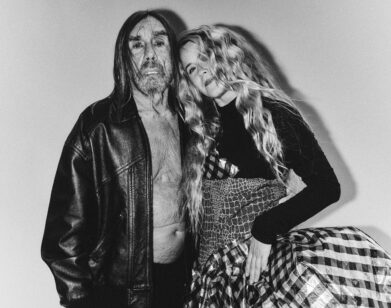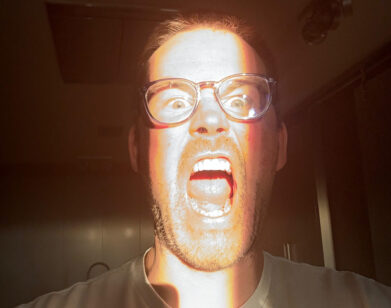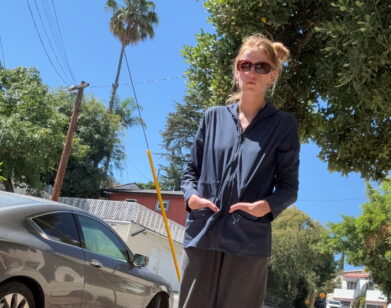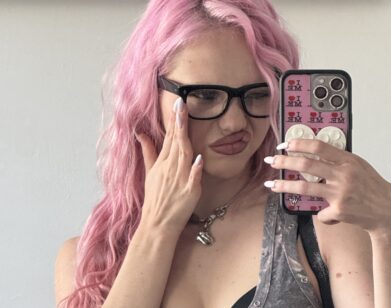Free Like Sinkane
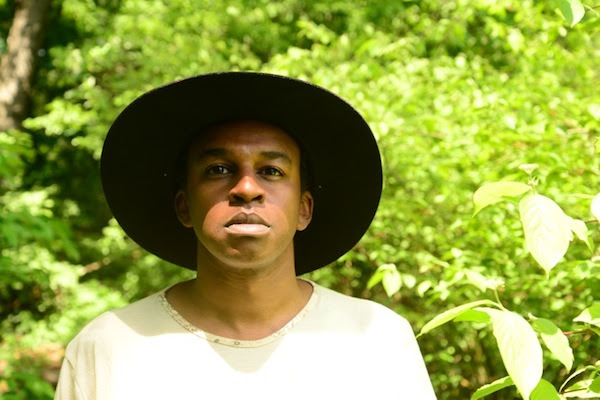
ABOVE: AHMED GALLAB. PHOTO COURTESY OF SHERVIN LAINEZ
“We’ve got life right in the pocket / Don’t you know what I mean?” sings Sinkane on his latest single, “How We Be.” Sure, it’s a bit cosmic, but give his latest critically acclaimed album, Mean Love (DFA Records), a good listen, and you might begin patting your pockets down, feeling for a palpable hint of the “life” of which he so soothingly coos.
Sinkane, the brainchild of multi-instrumentalist Ahmed Gallab, brings listeners to an ease and instigates contemplation of day-to-day charms. But that’s not to say Mean Love is at all a simple endeavor. Traditional pan-African tribal rhythms dance throughout his electronic funk production, drawing on an array of genres and influences—including Gallab’s own Sudanese roots—to create something entirely his own. And having just acted as music director to Atomic Bomb! The Music of William Onyeabor at BAM in May, he’s garnered quite the reputation for doing so.
The video for “How We Be” is equally indicative of Sinkane’s unconventional use of musical ingredients. A love letter to New York, it was filmed everywhere from Times Square to Red Hook, capturing the melting pot of the city while also showcasing some wickedly tight choreography by Devin Alberda and others.
Fresh off a few European gigs, Sinkane comes back through Brooklyn this Sunday, October 5 to play Baby’s All Right with Helado Negro. We chatted with Gallab about working with musicians that share his multifarious vision, becoming a true-blue New Yorker, and immortalizing an invented African god.
BENJAMIN LINDSAY: Where does the name Sinkane come from?
AHMED GALLAB: It comes from a Kanye West song: “Never Let Me Down.” I misheard J. Ivy in that song, rapping about Joseph Cinqué. He said, “I wanna get us ‘us free’ like Cinqué,” and I thought he said “sinkane,” and I kind of crafted this idea of what I thought sinkane meant. I figured maybe Sinkane is this monolithic African god that has this story that’s been passed down through African folklore from one generation to the next, and it was brought to America through the slave trade, and it became immortalized in African studies classes in college and stuff. I never bothered to look it up online what the actual lyric was, and when I finally did, I realized I completely misheard the lyric altogether. There’s no such thing as sinkane, and this idea of sinkane was completely crafted by me, and it was right around the time I was going to release my first record, and that was the name that stuck.
LINDSAY: Oh, that’s awesome! So it’s really that you kind of imbued Sinkane with this whole narrative yourself, thinking it was from Kanye. It’s funny, I wouldn’t put it past Kanye to be rapping about some monolithic African god himself. Now, with Mean Love, obviously everything’s not happy-go-lucky given the title, but you’re definitely having some fun on this album. What are you most looking forward to in taking it on the road?
GALLAB: I’m having a lot of fun with my band. We’re learning how to play with each other in a way that I feel like is beneficial for us in the long run. Ish Montgomery on bass, Jonny Lam on pedal steel guitar, and Jason Trammell on drums. Between the four of us, we’re really turning into a family and a solid unit. It’s very exciting to be in the place that we’re in right now because we’re ironing out a lot of things and everyone is kind of establishing their role in the band in a very amazing way, and it’s turning into a force.
LINDSAY: Was it difficult for you to find bandmates that share the same musical philosophy as you? You’re drawing a lot from your African roots and retro soul; that’s not really what a lot of people are doing these days.
GALLAB: I didn’t really expect to find people who get the music exactly the way that I get it. That’s a little ambitious, I think. I also didn’t necessarily bring in the people who play with me solely based off the fact that they knew my influences and where the music was coming from. I mean, I’m the only Sudanese person in the band; I’m the only East African person in the band, and these guys don’t necessarily understand the East African influence like I do. I think, more than anything, it was the energy, the spirit of the musician. [They] have very good spirits and a very positive energy in them, and I knew that they could come and approach this music in a way that I wasn’t going to approach it and could help create something that was much greater than something I could have ever done myself.
LINDSAY: Do you find that you’re drawing from racial themes or political themes lyrically, or is it mostly the classic tropes of R&B and soul?
GALLAB: I don’t like to talk about politics in my music; I don’t think that there’s room for it there. But I think this record in particular is very personal, and the themes on the record are all personal things that I feel like I’ve dealt with but are ideas and topics that anyone can relate to. Not necessarily “love,” but the idea of love and reinterpreting and re-appropriating love into other things. You know, like your relationship with yourself and your relationship with the world and how having a relationship with the world kind of seems similar to the way you have a relationship with a significant other. Or the ideas of longing and nostalgia and family and heaven—a lot of people can relate to those ideas, and I can give them my story.
LINDSAY: I definitely see those themes in your first single, “How We Be.” The video’s gorgeous with all the choreography you having going on. Could you tell me a bit about how it all came together?
GALLAB: The director, Nick [Bentgen], had a great concept about incorporating different parts of New York and different dance styles together and restructuring the way you would see a dance performance. So it kind of looks like everything is moving forward, but it’s moving backwards and forward at the same time. It’s really a bit strange if you take a closer look at it, and it speaks to the nature of the song because it’s a very carefree song. It’s about being confident and owning it; life is tough, but you gotta keep your chin up and stay positive.
LINDSAY: I loved being able to recognize certain areas. The painted cement truck—I assume that was somewhere in Bushwick, right?
GALLAB: Yup, absolutely. We went all around New York. We went to Red Hook; we went to Bushwick; we went to Times Square; we went to a lot of different places. I had a really good time making it—it was a lot of fun.
LINDSAY: How long have you lived in the city?
GALLAB: I’ve been living in New York for six years in December.
LINDSAY: At what point did you start considering yourself a New Yorker?
GALLAB: Well, everyone keeps telling me that you can’t consider yourself a New Yorker until you’ve lived here for 10 years, so I don’t know if I’m a New Yorker yet. The first few years that I lived here, I was touring all the time, so I really didn’t get to experience the city. Honestly, it hasn’t been up until now that I really feel like I’m learning about New York. I’m exploring the city a bit more and really embracing it. It took me a while; I think it takes a lot of people a while to really enjoy New York because it’s a very challenging place to live. I’m getting to a place where I understand it a lot more and I’m appreciating it a lot more.
SEE SINKANE AT BABY’S ALL RIGHT ON SUNDAY, OCT. 5. MEAN LOVE IS AVAILABLE NOW VIA DFA RECORDS. FOR MORE INFORMATION ON THE BAND, VISIT ITS WEBSITE.



